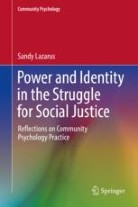
About this book series
The Community Psychology book series is envisaged as a space to review the established assumptions and knowledge economy underlying community psychology, and encourage writings that recognize the plurality of people and the many geographical, psychological and sociological locations that they occupy. The book series will enable contributors to stimulate thought that questions that which is constructed as critical knowledges, community psychology, and the meanings of liberation and community. Contributions to the book series draw attention to the applications of community psychology in the Global South and the Global North as they relate to such issues as violence, socio-economic inequality, racism, gender, migration, dispossession, climate change, and disease outbreaks. In do so, it centers community psychology as focused on the well-being of collectives, and dealing with such focal issues as deploying psychology to support social justice, the relevance and appropriateness of its internal logic, and methods that deal with the range of psychological, social, cultural, economic, political, environmental, epistemic, and local and global influences that bear on the quality of life of individuals, communities and society. The book series concentrates thus on the following three key areas of focus: 1) decoloniality, power and epistemic justice, 2) knowledge production, contestation and community psychology, and 3) community psychology in context. The series is of vital and immediate relevance to researchers, practitioners, faculty and students from the intervention sciences, including anthropology, sociology, public health, development studies, social work and urban studies.
- Electronic ISSN
- 2523-725X
- Print ISSN
- 2523-7241
- Series Editor
-
- Mohamed Seedat,
- Shahnaaz Suffla
Book titles in this series
-

-
Decolonial Enactments in Community Psychology
- Editors:
-
- Shose Kessi
- Shahnaaz Suffla
- Mohamed Seedat
- Copyright: 2022
Available Renditions
- Hard cover
- Soft cover
- eBook

-
Decoloniality and Epistemic Justice in Contemporary Community Psychology
- Editors:
-
- Garth Stevens
- Christopher C. Sonn
- Copyright: 2021
Available Renditions
- Hard cover
- Soft cover
- eBook

-
Decolonial Feminist Community Psychology
- Editors:
-
- Floretta Boonzaier
- Taryn van Niekerk
- Copyright: 2019
Available Renditions
- Hard cover
- Soft cover
- eBook

-
Power and Identity in the Struggle for Social Justice
Reflections on Community Psychology Practice
- Authors:
-
- Sandy Lazarus
- Copyright: 2018
Available Renditions
- Hard cover
- eBook

